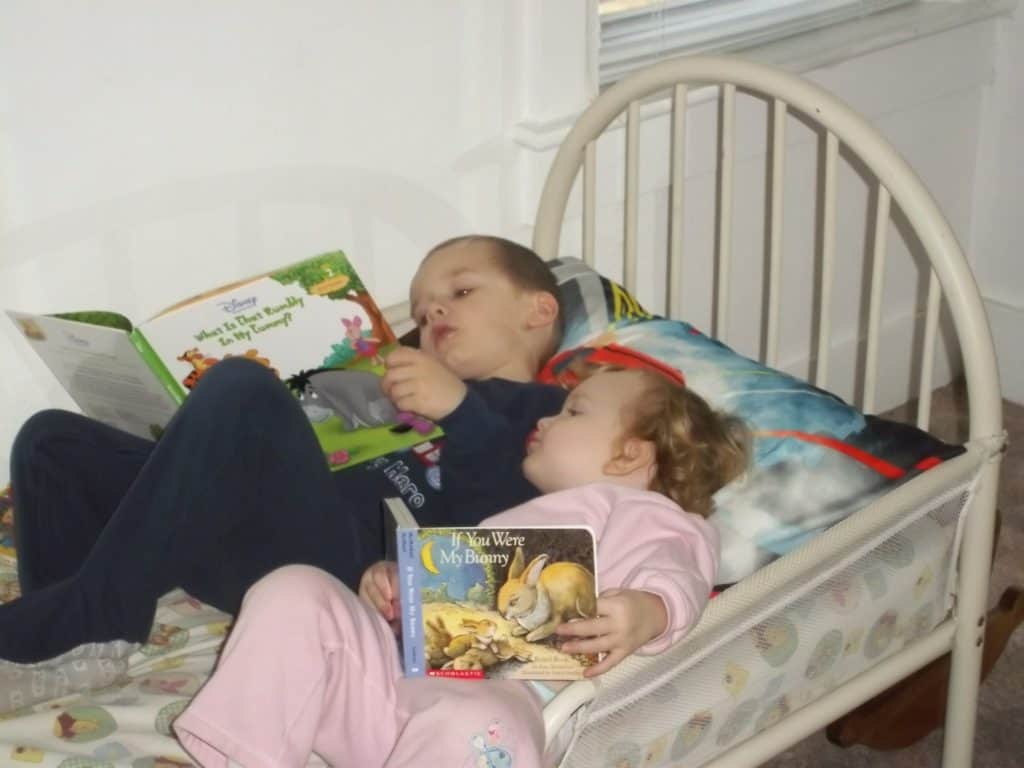Should I Require that my child Read daily?

As homeschooling mamas, we wrestle with multiple questions and problems every day. How do I teach my children everything that they need to know? What is the best curriculum to use? Where can I find all of the resources that I need? How can I manage my homeschool and my life? Each of these questions has plagued me at one time or another, in addition to countless more. However, one question that I struggle with almost on a daily basis is this one: Should I require that my child read daily?
Over my twelve years of homeschoooling, I have bounced back and forth between answering “yes” and “no” to this question. In the twelve years that I taught school, I assigned reading homework each night. Each student needed to read for twenty minutes. Each set of parents needed to sign their reading log and send it back to school. I assigned this reading homework because I believed that each student would only improve their reading with daily practice.
I carried this belief into my mamahood. Thus I read to my babies each night before bed. As a baby Super Stuffy would love to sit and listen to me read for two or more hours at a time. This thrilled me, because I just knew that both he and Bear Bear would love to read.



I destroyed their love for reading
But when it came time to truly teach Super Stuffy how to read, it turned into a chore. Oh, how he struggled. I pushed him past his frustration point so many times that he grew to despise reading. Once I saw this, I completely backed off from teaching him how to read. But the damage had already been done. I had completely destroyed his love for books and reading.
I wavered between knowing that my kids needed the practice that reading daily provides in order to become fluent readers, to knowing that by forcing them to read I contribute to their dislike of reading. What in the world should I do? They needed the practice, but I only increased their dislike for the activity.
Why I should require them to read daily:
Reading practice creates fluency
Anything that we learn takes practice. We have all heard the maxim, “Practice makes perfect” I don’t believe that, but I do believe this one: “Practice makes easier.” The more one practices at reading, the easier it becomes. But in order to get that practice, reading needs to be done consistently and often.
Reading increases memory and imagination
Some of my favorite memories come from the books that I read when I was a kid. I still can see the pictures in my head that I imagined when I read my favorite books. Reading allows you to open your mind and imagine different scenarios and possibilities that you would otherwise not come up with. It allows my children to form pictures in their minds for themselves, and not depend on someone else’s imagination to create those pictures. Reading also allows them to connect new information with things that they already know.
Reading increases vocabulary
To read daily for 20 minutes, 5 days a week exposes you to 1.8 million words every year. Learning all of that new vocabulary gives the reader a wealth of words that can be used to speak and write in order to communicate your ideas. This reading practice exposes my kids to many new words that they would not encounter otherwise.
Reading increases knowledge
The more you read, the more knowledge you gain. Learning more results in the ability to be articulate and well informed. You never know when you might need a fact or some knowledge that you have read about previously. That increased learning also gives you a basis to draw from when you are trying to figure out a solution to a problem or managing a crisis. And the things that you obtain in this life can be taken from you, but no one can ever take away the knowledge that you have gained.
Reading can take you to places that you can’t get to otherwise
In my life I have visited England, the deep South, Russia, China, and Israel among others. But physically I have never seen these lands. I have visited them in the stories that I have read throughout my life. Reading allowed me to learn a little bit about their culture and their people. I can also time travel when I read. Many times I have visited ancient Egypt, Israel in the time of Jesus, the south before the Civil War, and England in the time of Henry VIII and Queen Elizabeth. I want my children to experience times and places in the books that they read that they most likely won’t ever be able to really see.
Reading requires no electricity
How often during each day do we frantically try to find a charging cord and an outlet because our device is dying? Or, have you ever not known what to do when the electricity or the internet goes out? Reading requires no charging cords, no electricity, and no internet. I love my tablet and my Nook app, but a book is always available even when I don’t have access to the internet or electrical power.
Why I should NOT require them to read daily:
Being forced to read creates a dislike for reading
It is an interesting quirk about human nature that anything that we are forced to do, we automatically resist doing it. Even if it is something we enjoy! Over and over my kids have told me that they would enjoy reading more if I didn’t force them to do it. I also experienced this in my own life. I devoured books like The Phantom Tollbooth, The Hobbit, and Gone with the Wind. Because I enjoyed these books, I had no trouble reading them. But I hated doing my assigned reading for class. Assigned reading is a chore, reading for fun is immensely enjoyable.
You can learn facts fast with technology
With the evolution of the internet, information rushes around the world faster than the speed of lightning. We have access to more information in one day than a person 150 years ago learned in their entire life. Almost anything imaginable can be found on the internet, and it is relatively easy to find. My children have learned a lot from the internet. Almost daily they come to me with a new fact that they have learned from something they found online. Technology can be a great learning tool.
So, what do I do?
I model reading to my children
Even though I love to read, as a busy mama, I don’t get much time to just read for fun. I have made it a point to make my own time to read daily just for fun. If I don’t model it myself, then why should my kids read for fun? When they see me read and enjoy it, then it increases their curiosity and desire to be with me and do what I am doing.
I let them choose which books they want to read
While I would love for them to read good, living books, I have let go of that and allow them to read what they enjoy. Maybe someday they might choose some good quality literature, but today I want them to read what they enjoy. In this way, hopefully they will build many good memories with their favorite books. Then these good memories would translate to an enjoyment of reading as they get older.
Requirement of one chapter read per day
I felt that this was a happy medium for my kids. I had tried to require a certain amount of time per day, such as 20 or 30 minutes, but I found that they just watched the clock instead of read their book. This way, they can enjoy the book more because they are not focused on the amount of time that they are reading. And I do not want to leave their reading completely voluntary, because there are so many other things that constantly call for their attention. They would probably not choose to read very often otherwise.
Reading Challenge
I firmly believe that reading a good book is its own reward. But without the experience of reading many good books and enjoying them, my kids will never reach that realization. So I have created different challenges for reading, from small to large. For example, after my kids read one book, they can stay up one hour later at night. Our biggest challenge is a family challenge. When the three of us read 36 books all together, we get to go out for a family dinner or a movie. When I am included in the reading challenge, I model to my children the love of reading that I have. I hope that this modeling will encourage their own love of reading.
My kids keep track of the books that they read in their reading log, but for our challenges they each have an animal cutout that they fill in with the title of the book, the author, and the favorite part of their book. In this way, I do not have to keep track of the books that they read. I just let them know that if they want their reward for meeting a challenge, then their cutout needs to be on the wall.
Have any of my ideas inspired your own thoughts about reading? Leave a comment below!






